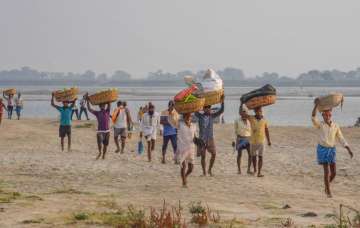Lockdown 2.0 revised guidelines: Check sector-wise list
By issuing revised guidelines for lockdown 2.0, the Modi government has set the ball rolling for limited economic activity. Select sectors and services like repair workers, plumbers and electricians will be allowed with conditions. IndiaTvNews.com lists key takeaways from the Home Ministry's consolidated revised guidelines to restart the economy. Sector-wise list:

Lockdown 2.0: IndiaTvNews.com lists key takeaways from the Home Ministry's consolidated revised guidelines to restart the economy, especially in the essential and agriculture services. From education to goods transportation to Information Technology, the Modi-government took an important step by partially lifting restrictions to further ease things.
Key points in the Ministry of Home Affairs' consolidated revised guidelines for Lockdown 2.0:
Health
All health services, including AYUSH, will remain functional.
These include hospitals, nursing homes, clinics, telemedicine facilities, dispensaries, chemists, pharmacies and all kinds of medicine shops.
Veterinary hospitals, dispensaries, clinics, pathology labs, sale and supply of vaccine and medicines will remain functional.
Manufacturing
Manufacturing units of pharmaceuticals, medical devices, medical oxygen and those manufacturing their packaging material, raw material and intermediates will remain functional.
So will construction of health infrastructure.
Agriculture/Horticulture
All agricultural and horticultural activities to remain fully functional.
These include farming operations by farmers and farm workers in fields and agencies engaged in procurement of agriculture products, including MSP operations.
Mandis operated by the Agriculture Produce Market Committee or as notified by state and Union Territory governments will remain functional
Movement of fish and shrimps, and fish products, fish seed and feed will be allowed, and workers for all these activities will operate.
Operations of tea, coffee and rubber plantations, with a maximum of 50 per cent workers, will be allowed.
Processing, packaging, sale and marketing of tea, coffee, rubber and cashew, with a maximum of 50 per cent workers, is allowed.
Collection, processing, distribution and sale of milk and milk products by milk processing plants, including transport and supply chain, operation of animal husbandry farms such as poultry farms and hatcheries and livestock farming activity will be allowed.
Financial Sector: Banks/ATMs
In the financial sector, the following will remain functional:
Reserve Bank of India (RBI) and RBI regulated financial markets and entities like NPCl, CCIL.
Bank branches and ATMs.
SEBI, and capital and debt market services as notified by the Securities and Exchange Board of India (SEBI), IRDAI and Insurance companies.
Social Sector
In the social sector, the following will remain functional:--
Operation of homes for children, disabled/mentally challenged, senior citizens, destitutes, women, widows, observation homes, after care homes and places of safety for juveniles.
Disbursement of social security pensions, such as old age, widow, freedom fighter pensions; pension and provident fund services.
Operation of anganwadis - distribution of food items and nutrition once in 15 days at the doorsteps of beneficiaries like children, women and lactating mothers.
Beneficiaries will not attend the anganwadis.
Education Sector
All educational, training, coaching institutions shall remain closed.
These establishments will maintain the academic schedule through online teaching.
Maximum use of Doordarshan (DD) and other educational channels can be made for teaching purposes.
MGNREGA works are allowed with strict implementation of social distancing and face masks.
Public Utility
Public utilities that will remain functional:
Operation of the oil and gas sector, including refining, transportation, distribution, storage and retail of products like petrol, diesel, kerosene, CNG, LPG, PNG.
Postal services, including post offices.
Operations of utilities in water, sanitation and waste management sectors, at municipal local body levels in states and UTs.
Operation of utilities providing telecommunications and internet services.
Transportation
Movement loading, unloading of goods and cargo (inter and intrastate) is allowed.
All goods traffic will be allowed to ply.
Movement of all trucks and other goods and carrier vehicles with two drivers and one helper subject to the driver carrying a valid driving licence.
An empty truck or vehicle will be allowed to ply after the delivery of goods, or for pick up of goods.
Shops for truck repairs and dhabas on highways, with a stipulated minimum distance as prescribed by the states and UT authorities.
Supply of essential goods is allowed.
Shops (including kirana and single shops selling essential goods) and carts, including ration shops (under PDS), dealing with food and groceries (for daily use), hygiene items, fruits and vegetables, dairy and milk booths, poultry, meat and fish, animal feed and fodder etc, should be allowed to operate, ensuring strict social distancing without any restriction on their timing.
Offices: Private Establishments/Media/IT Companies
Commercial and private establishments, as listed below, will be allowed to operate:
Print and electronic media, including broadcasting, DTH and cable services.
IT and IT-enabled services, with up to 50 per cent strength; data and call centres for government activities only.
E-commerce companies.
Vehicles used by e-commerce operators will be allowed to ply with necessary permissions.
Courier services.
Services provided by self-employed persons like electricians, IT repair personnel, plumbers, motor mechanics, and carpenters.
Movement of private vehicles in emergency
Movement of persons is allowed in the following cases:
Private vehicles for emergency services, including medical and veterinary care, and for procuring essential commodities.
One passenger besides the private vehicle driver can be permitted in the backseat, in case of four-wheelers.
Two-wheelers, only the driver of the vehicle is to be permitted.
Persons to remain under mandatory quarantine:
*All such persons who have been directed by health care personnel to remain under strict home/institutional quarantine for a period as decided by local health authorities.
*Persons violating quarantine will be liable to legal action under Section 188 of the lPC.
PTI
(Details as per Home Ministry's revised consolidated guidelines)